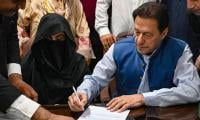ISLAMABAD: Prime Minister Imran Khan Friday regretted that the National Accountability Bureau (NAB) had been working for 23 years but had not been able to curb corruption.
The reason was that only small people (criminals) are caught in our country, while the lesson from China was that when the people at the top were arrested, only then corruption was reduced.
Addressing the inaugural ceremony of Virtual Karachi Nuclear Power Plant Unit-2 (K-2) from Islamabad, the PM said that one could learn from China how they fought against corruption and showed that no country could progress unless corruption, especially at the top, was eradicated and the powerful were brought under the rule of law.
The PM quoted the Chinese diplomat as saying that they had sentenced about 400 people at the ministerial level for corruption, which was very important to curbing the menace.
He virtually inaugurated the K-2 and said the unit would generate 1,100 megawatts of clean energy and “this is important for us because Pakistan is among the top 10 countries at risk due to climate change”.
Speaking during the ceremony, he said that the unit was established because of cooperation between Pakistan and China. He pointed out that glaciers supply 80 per cent of Pakistan's water needs while glaciers were melting at a rapid speed, and our coming generations will face an acute water shortage as well as food security issues if the effects of climate change are not reversed.
The PM emphasised that clean energy was important for the country and regretted that Pakistan had not tried to use renewable resources for producing electricity in the past. “Unfortunately, we have not focused on producing energy from water despite the country having the potential to do so.
“The new project will help to train manpower and facilitate technology transfer from China”, he said adding that 40,000 experts visited the country over an extended period of time. "This is another area of cooperation with China,” he noted.
He expressed confidence that the project would greatly benefit Pakistan in respect of technology transfer and training of the youth in addition to supply of clean energy. He acknowledged Pakistan and China have a unique relationship for the last 70 years, which is getting fortified with every passing day.
Imran Khan also said the people of Pakistan have emotional attachment with China believing that it always helped the country in the hour of need. He emphasised further enhancement of people-to-people contacts.
He said Pakistan was desirous of learning from China in various sectors, including managing the fast expanding urban centres, poverty alleviation and controlling corruption while the scope of CPEC was being expanded from the connectivity and power sector projects to establishment of economic zones and agricultural technology.
Premier Imran pointed out that Pakistan was also celebrating 70 years of diplomatic relations with China on Friday and it was a very unique relationship, which extends to all levels. “We are confident that China will stand with us during difficult times. It is fortunate for us that Pakistan has strong ties with an emerging power and a developed country such as China and people-to-people contact will also now increase. China has faced problems similar to the ones Pakistan is facing today and we have a lot to learn from them,” he said.
The chairman of the China Atomic Energy Authority said that the power plant was being inaugurated on the 70th anniversary of the establishment of diplomatic relations between Pakistan and China. He said China and Pakistan have been extending support to each other and cooperating in various fields.
The K-2 has 60-year life expectancy, extendable to 20 more years. It is designed with higher plant availability and capacity factors, and extended refuelling cycle.
The construction of K-2 commenced in November 2013, whereas its fuel loading started on Dec 1, 2020 after approval from the Pakistan Nuclear Regulatory Authority. After further reactor physics tests, the plant was connected to national grid on March 18, 2021 for trial operation and power escalation tests.
Meanwhile, Prime Minister Imran Khan Friday addressed the Nikkei's 26th Conference on the ‘Future of Asia’ virtually, Theme of the conference was: ‘Shaping the Post-Covid Era: Asia's Role in the Global Recovery’.
Virtually addressing the event, he said Pakistan desired peaceful, cooperative relations with all its neighbours, including India. However, he added, New Delhi must stop human rights violations in the Illegally Occupied Jammu and Kashmir (IIOJ&K) and revisit the unilateral measures it took on Aug 5, 2019. “It is essential that an enabling environment is created for dialogue to peacefully resolve the Jammu & Kashmir dispute in accordance with the UNSC resolutions and the wishes of the people of Kashmir,” he added.
The premier said, “We hope that the other threats to peace and security in Asia will also be resolved. The situation in Palestine remains a matter of deep concern for everyone. “The international community must take urgent actions to stop the Israeli attacks against Palestinians, prevent the desecration of holy places, especially Al-Aqsa Mosque, and facilitate a just and lasting solution in line with the relevant UN resolutions and the two-state vision”.
The China-Pakistan Economic Corridor (CPEC), he noted, was a flagship project of the Belt and Road Initiative. It has generated economic activity, employment and will enhance bilateral and regional trade. Pakistan has invited all friendly countries to join in investing in the several economic and industrial zones being established under the CPEC umbrella.
The PM noted that Pakistan had actively supported the peace process in Afghanistan. As foreign forces withdraw from Afghanistan, it is imperative to redouble efforts to promote the peace process between the Afghan parties.
He explained, “Our first priority, at present, is to confront and conquer the Covid-19 pandemic. This virus has created the worst global health, economic and social crisis in the past 100 years.
“It has infected hundreds of millions, killed over 3 million people, reversed economic growth, enlarged poverty, and worst of all created huge unemployment. Unless fully contained, it could create social chaos and threaten peace and security in Asia and elsewhere in the world.
“No one will be safe unfortunately until everyone is safe. We must act collectively to ensure that the Covid vaccines are made available to everyone, everywhere, and as soon as possible. The vaccine’s supply and distribution must be immediately expanded; patent rights waived; production ramped up, including in the developing world; and the COVAX facility fully extended and funded,” PM Imran said.
“I had proposed a 5-point agenda for debt relief, SDR creation and re-allocation, larger concessional finance, fulfilment of climate finance commitments, and an end to illicit financial flows from developing countries. The PM continued that to ensure rapid recovery, we in Asia, and elsewhere, must keep economies open, revive disrupted supply chains, and resist protectionist temptations and if Asian and other countries are to achieve the Sustainable Development Goals by 2030, and net-zero carbon emissions by 2050, we will need to invest massively in new and sustainable infrastructure – energy, transportation, housing, agriculture and industry. Both public and private investment should be mobilised to this end.
He was of the view that resilient and dynamic economic growth, particularly in Asia, depends significantly on greater integration and physical connectivity. China’s Belt and Road Initiative provides the important pathway to such regional integration across the Asia-Pacific Region and beyond. We welcome proposals from Japan and others to support and finance “quality” infrastructure in Asia and elsewhere.
PM Shehbaz says that federal and provincial governments should arrange Namaz-e-Istisqa across country
CM says young interns will also get monthly stipend of Rs50,000 for six months
PCB awaits response from ICC to questionnaire sent two days ago following India’s verbal communication
New Delhi consistently tops world rankings for air pollution in winter
Crime rate in tribal areas under control of Border Military Police is only 10pc compared to DG Khan where police are...
Minister says FBR prepared a Transformation Plan for digitisation and broadening the narrowed tax base







